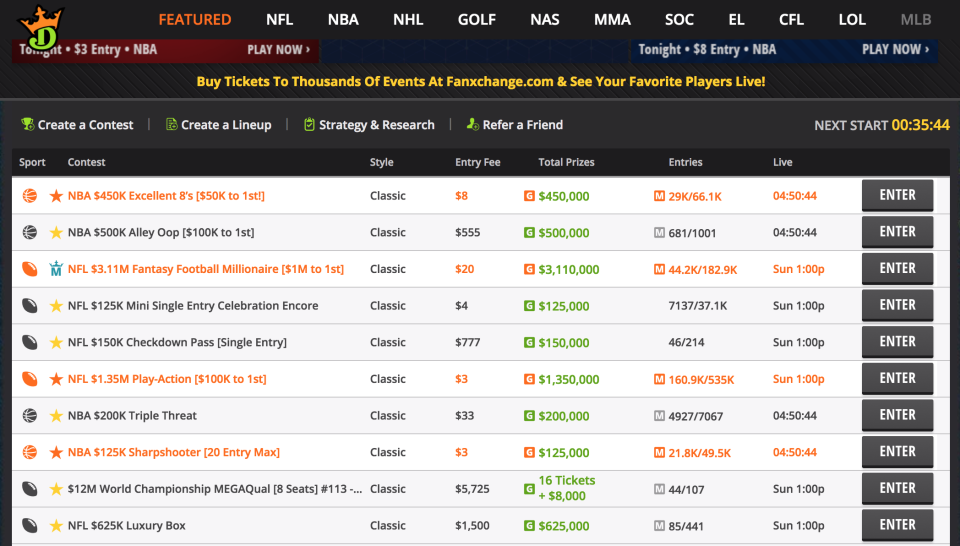British sports lawyer on DraftKings, FanDuel: 'It looks like betting'
Next year may bring major changes in American gambling law, thanks to Christie et al vs NCAA et al, a long-lingering case that the U.S. Supreme Court will hear on Dec. 4.
And “daily” fantasy sports (DFS) companies DraftKings and FanDuel have played a role in the momentum, whether they publicly acknowledge it or not.
At issue in the Dec. 4 case is whether the state of New Jersey can legalize sports betting in its state, despite PASPA (Professional and Amateur Sports Protection Act), the 1992 federal law that banned sports betting everywhere in America but Nevada. On the other side are the NCAA, NBA, NFL, MLB, and NHL, which oppose New Jersey’s case even though most of them have expressed support for legalized sports betting. They would rather see PASPA repealed at the federal level than have gambling become a state-by-state issue.
Either way, regardless of whether New Jersey wins its case, the gaming industry is optimistic that change is coming imminently to America’s stringent gambling laws. That’s thanks to a wide range of factors, including the fact that President Donald Trump is a former casino owner.
Another big factor is DFS, which experts say has contributed to the momentum toward legalized betting.
DFS “has been the most significant thing” in the effort toward legalizing sports betting
DFS “was a great opportunity,” American Gaming Association president Geoff Freeman told Yahoo Finance earlier this year. “Frankly, I think that has been the most significant thing when it comes to raising attention to the demand consumers have to no longer be passive, but to be engaged in these games one way or another.”
Yet the companies themselves have insisted, since their inception, that their games are not a form of sports betting.
They have made this argument by relying on a carveout in a different federal law, the Unlawful Internet Gambling Enforcement Act of 2006 (UIGEA) that prohibited gambling online and essentially killed online poker. UIGEA had a specific carveout for fantasy sports as “games of skill” rather than chance.
“It looks like betting”
To gaming industry observers outside the U.S., where sports betting is perfectly legal, the distinction is nonexistent.
“It’s always very interesting from British eyes to look at the daily fantasy arguments that were going on about whether it was or wasn’t betting,” says Tom Russell, general counsel of Genius Sports, a London-based firm that provides betting data and analytics to legal sportsbooks and sports leagues.
“I mean, we have fantasy sports in the UK as well, and it’s widely recognized that they are betting. And to British eyes, it looks like betting,” Russell says. “I don’t want to wade into that argument, particularly as a non-American, but I think we view that as probably betting.”
Indeed, while DraftKings and FanDuel have relied on the argument that their contests require “predominantly skill” to win (players carefully draft a lineup of real-life players and rely on their research and knowledge of the sport to do so), many feel it’s a stretch to argue that setting a lineup of athletes you believe will perform well is something without significant chance involved.
Moreover, early advertisements for DraftKings and FanDuel focused on the fast-paced excitement of playing daily fantasy, and showed regular people celebrating after big windfalls, and being handed large novelty checks. (Both companies have since shifted the tone of their marketing.) The DraftKings “lobby,” the homepage that shows all of their current active contest pools, does not look so different from the electronic screens at a sportsbook in Las Vegas.
[Russell is the guest on our latest Sportsbook podcast; you can listen on iTunes or scroll to the bottom of this post.]

At this point, the companies no longer need to worry as much about whether people believe they are betting operators or not: the momentum is on their side. Sicteen states have now passed laws to expressly legalize and regulate daily fantasy sports, and for the most part, experts say, the new regulations are relatively easy, and relatively cheap, for DraftKings and FanDuel to follow.
Last year, DraftKings and FanDuel both applied for, and received, UK gambling licenses, a move that some say undermined their narrative of not being betting operators. FanDuel later pulled out of the UK after one year of operating there. This year, DraftKings opened an office in Malta, a small but influential nation in issuing overseas gaming licenses, and got licensed there. And Paddy Power BetFair, an Irish sportsbook, bought a DraftKings competitor, the smaller DFS app Draft.
If sports betting is legalized in the US down the road, DraftKings CEO Jason Robins has said the company would weigh its options, a suggestion that it might just become a sportsbook.
Russell of Genius Sports says that the long-lasting influence of DFS on betting law in America may end up being something more abstract: “what daily fantasy has shown, quite clearly, is that there is a clear demand in the U.S. for that type of activity. People want to be watching their favorite team and they want to be making calls on what the next basket or next touchdown will be, or whatever it is. It shows that a properly run sports betting market could be very successful here.”
Disclaimer: Yahoo offers a daily fantasy sports product.
—
Daniel Roberts is the sports business writer at Yahoo Finance. Follow him on Twitter at @readDanwrite. Sportsbook is our sports business video and podcast series.
Read more:
NBA lawyer says NBA will push Congress for legalized sports betting
NFL lawyer hints at league’s stance on gambling
MLS Commissioner: Columbus team move isn’t a done deal
MLB commissioner: ‘We are reexamining our stance on gambling’

